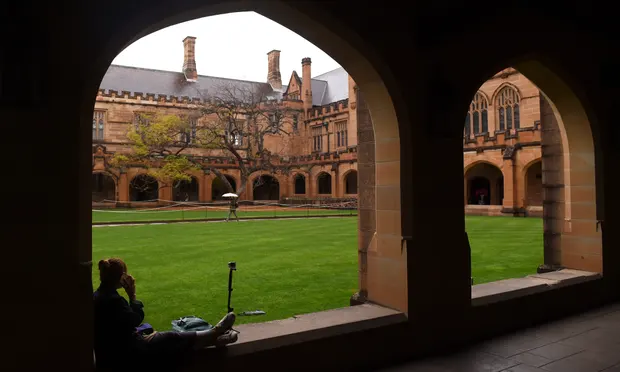Guardian:
Sydney academic had ‘intellectual freedom’ to superimpose swastika on Israel flag, judge finds
Federal court rules University of Sydney lecturer Tim Anderson who visited Bashar al-Assad should not have been fired
A controversial Sydney academic who superimposed a swastika over an Israeli flag did so under the protection of intellectual freedom and should not have been fired as a result, a federal court judge has found.
Dr Tim Anderson worked at the University of Sydney from February 1988 until he was dismissed in February 2019. At the time he left, he was a senior lecturer in the Department of Political Economy.
During his time at the university, he made a number of statements including that a News Corp journalist was a “traitor” because of a story on the Armenian genocide and that United States senator John McCain was a “key US war criminal”.
He also said News had spread “deceitful war propaganda” supporting what he called a terrorist war in Syria, and superimposed a swastika over an Israeli flag in a slideshow presentation about media coverage of the Palestine conflict.
Anderson was also part of a delegation that travelled to Syria in 2013, meeting with government and non-government figures including its president, Bashar al-Assad.
In response to his statements, University of Sydney issued two separate warnings to Anderson – in August 2017 and October 2018 – before dismissing him in February 2019.
Federal court justice Tom Thawley on Thursday found Anderson’s comments were made under the protections of intellectual freedom and that the terms of his employment contract meant he could not be fired for them.
Warnings made over the statements were a breach of contract as was the university’s decision to dismiss him, the judge found.skip past newsletter promotion

Prof Stephen Garton, who was deputy vice-chancellor while Anderson worked at University of Sydney, also breached employment law by issuing the warnings, Thawley said.
In a statement, the university said it was “disappointed” by the decision.
“We note that we previously succeeded in having all other aspects of the proceedings dismissed. We will now take time to review the decision and consider our response and next steps. We won’t make further comment on this matter at the current time.”
Anderson, backed by the National Tertiary Education Union, had initiated federal court proceedings against his former employer in 2019.
After initially losing the lawsuit in November 2020, Anderson then launched a successful appeal.
The full court found academics at the institution were allowed to express even “deeply offensive and insensitive” views under the banner of intellectual freedom as long as they did not harass, vilify or intimidate anyone, and sent the case back to be reheard.
A university spokesperson said on Friday that the institution remained committed to the expression and protection of intellectual freedom which should be exercised responsibly and to the highest ethical, professional and legal standards.
“We also believe that civility and respect should be particularly valued when people disagree with each other,” the spokesperson said.
Federal court rules University of Sydney lecturer Tim Anderson who visited Bashar al-Assad should not have been fired
A controversial Sydney academic who superimposed a swastika over an Israeli flag did so under the protection of intellectual freedom and should not have been fired as a result, a federal court judge has found.
Dr Tim Anderson worked at the University of Sydney from February 1988 until he was dismissed in February 2019. At the time he left, he was a senior lecturer in the Department of Political Economy.
During his time at the university, he made a number of statements including that a News Corp journalist was a “traitor” because of a story on the Armenian genocide and that United States senator John McCain was a “key US war criminal”.
He also said News had spread “deceitful war propaganda” supporting what he called a terrorist war in Syria, and superimposed a swastika over an Israeli flag in a slideshow presentation about media coverage of the Palestine conflict.
Anderson was also part of a delegation that travelled to Syria in 2013, meeting with government and non-government figures including its president, Bashar al-Assad.
In response to his statements, University of Sydney issued two separate warnings to Anderson – in August 2017 and October 2018 – before dismissing him in February 2019.
Federal court justice Tom Thawley on Thursday found Anderson’s comments were made under the protections of intellectual freedom and that the terms of his employment contract meant he could not be fired for them.
Warnings made over the statements were a breach of contract as was the university’s decision to dismiss him, the judge found.skip past newsletter promotion

Prof Stephen Garton, who was deputy vice-chancellor while Anderson worked at University of Sydney, also breached employment law by issuing the warnings, Thawley said.
In a statement, the university said it was “disappointed” by the decision.
“We note that we previously succeeded in having all other aspects of the proceedings dismissed. We will now take time to review the decision and consider our response and next steps. We won’t make further comment on this matter at the current time.”
Anderson, backed by the National Tertiary Education Union, had initiated federal court proceedings against his former employer in 2019.
After initially losing the lawsuit in November 2020, Anderson then launched a successful appeal.
The full court found academics at the institution were allowed to express even “deeply offensive and insensitive” views under the banner of intellectual freedom as long as they did not harass, vilify or intimidate anyone, and sent the case back to be reheard.
A university spokesperson said on Friday that the institution remained committed to the expression and protection of intellectual freedom which should be exercised responsibly and to the highest ethical, professional and legal standards.
“We also believe that civility and respect should be particularly valued when people disagree with each other,” the spokesperson said.


Every Australian university is established by Acts of Parliament, which , among other things, ensure their academic freedom.
ReplyDeleteThere are no equivalent guarantees for ordinary citizens , especially with ordinary employees and employers.
If your public actions bring your employer into disrepute, an ordinary employee certainly can be subjected to disciplinary action.
WAITING for Ah Mok to be disciplined , and if necessary, terminated for his deeply offensive and abhorrent act superimposing the Nazi swastika on the Israel flag.